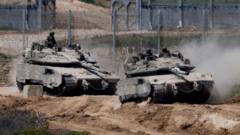Israel's security cabinet has approved a controversial strategy aimed at intensifying its military campaign against Hamas, targeting a full occupation of Gaza. This move follows the mobilization of tens of thousands of reservists, as officials emphasize an urgent need to increase pressure on Hamas in hopes of swiftly retrieving hostages and ultimately dismantling the group’s influence in the territory.
The decision comes just before U.S. President Donald Trump’s scheduled visit next week, during which the Israeli government aims to solidify its position in ongoing ceasefire discussions. However, plans to re-establish humanitarian aid deliveries through private channels have drawn criticism from the United Nations and other aid organizations, which stress that these measures violate fundamental humanitarian standards.
Israeli Prime Minister Benjamin Netanyahu has described the new strategy as a shift from prior operations, focusing on sustained territorial control in Gaza. The security cabinet has unanimously voted to progressively expand ground operations in Gaza, beginning with the capture of additional areas near the Gaza-Israel border, an act intended to provide Israel with leverage in negotiations regarding hostages and ceasefires.
But the escalating military offensive is met with skepticism; critics, including the Hostages and Missing Families Forum, argue that prioritizing territorial gains over the safety of hostages contradicts the will of many Israeli citizens. Despite government assurances, the hostage situation remains precarious with no hostages released since operations intensified.
The Israeli military's Chief of Staff has announced plans to increase military operations and dismantle Hamas’s capabilities. However, organizations tasked with humanitarian support warn that such approaches, which may involve restricting access and funneling aid through military-controlled channels, risk exacerbating the humanitarian crisis for Gaza’s most vulnerable populations.
The recent escalation of conflict follows a devastating cross-border attack in October 2023, which resulted in significant casualties and hostage situations. Since the onset of renewed hostilities, reports indicate that over 52,000 have lost their lives in Gaza, a stark reflection of the ongoing turmoil in the region, challenging not only military strategies but also pressing humanitarian needs.
The decision comes just before U.S. President Donald Trump’s scheduled visit next week, during which the Israeli government aims to solidify its position in ongoing ceasefire discussions. However, plans to re-establish humanitarian aid deliveries through private channels have drawn criticism from the United Nations and other aid organizations, which stress that these measures violate fundamental humanitarian standards.
Israeli Prime Minister Benjamin Netanyahu has described the new strategy as a shift from prior operations, focusing on sustained territorial control in Gaza. The security cabinet has unanimously voted to progressively expand ground operations in Gaza, beginning with the capture of additional areas near the Gaza-Israel border, an act intended to provide Israel with leverage in negotiations regarding hostages and ceasefires.
But the escalating military offensive is met with skepticism; critics, including the Hostages and Missing Families Forum, argue that prioritizing territorial gains over the safety of hostages contradicts the will of many Israeli citizens. Despite government assurances, the hostage situation remains precarious with no hostages released since operations intensified.
The Israeli military's Chief of Staff has announced plans to increase military operations and dismantle Hamas’s capabilities. However, organizations tasked with humanitarian support warn that such approaches, which may involve restricting access and funneling aid through military-controlled channels, risk exacerbating the humanitarian crisis for Gaza’s most vulnerable populations.
The recent escalation of conflict follows a devastating cross-border attack in October 2023, which resulted in significant casualties and hostage situations. Since the onset of renewed hostilities, reports indicate that over 52,000 have lost their lives in Gaza, a stark reflection of the ongoing turmoil in the region, challenging not only military strategies but also pressing humanitarian needs.





















